Guat Kwee See ’07 Helps Launch Centre For Interfaith Understanding in Singapore
The Centre for Interfaith Understanding (CIFU), an interfaith initiative providing an inclusive space and critical engagements that bridge theory and practice on interfaith issues, launched virtually on Oct. 30, 2020, with Guat Kwee See, MA ’07, proudly looking on.
Guat, who has kept in close touch with Hartford Seminary since her time here studying Christian-Muslim relations, is the first chairperson of CIFU with Founder Mohamed Imran, a known interfaith advocate in Singapore, as vice-chairperson. Its 10 founding members, prominent interfaith advocates and bridgebuilders in Singapore, are Christian, Muslim, Bahá’í, Buddhist, Hindu, Sikh, and Humanist.
Singapore is one of the most diverse countries when it comes to religious faiths. CIFU plans to develop programs in interfaith leadership, help strengthen the fabric of society, and bring interfaith discourse in Singapore to greater heights, with greater appreciation of diversity, challenging assumptions and stereotypes, and finding common ground, all things Guat enjoyed learning at Hartford Seminary. Read more
Adeel Zeb to Receive Award for Ethical Leadership
Adeel J. Zeb, a graduate of Hartford Seminary’s Islamic Chaplaincy Program, will receive a 2018 Award for Ethical Leadership from FASPE (Fellowships at Auschwitz for the Study of Professional Ethics).
Chaplain Zeb was a fellow in the FASPE program in 2013. FASPE “challenges future leaders to recognize and confront their ethical responsibilities by analyzing the decisions and actions of Nazi-era professionals. Fellows spend two intensive weeks in Germany and Poland, visiting historical sites and participating in rigorous seminars.”
FASPE will present the award at its annual gala in New York on March 5. “FASPE recognizes Chaplain Zeb for his commitment to the ethical role of clergy within their religious communities and in the larger religious and civic communities.”
Chaplain Zeb, who is the first Muslim president of the National Association of College and University Chaplains, is the Co-University Chaplain at the Claremont Colleges in Claremont, CA.
Aida Mansoor Joins Recruitment and Admissions Office
Aida Mansoor, a Hartford Seminary alumna who is actively involved in building relationships among people of different faith traditions, joined the staff of the Recruitment and Admissions Office in Fall 2017. She assists with new student enrollment, including a focus on Muslim students.
Aida graduated in 2016 with a Master of Arts in Religious Studies with a focus on Islamic Studies and Christian-Muslim Relations. She also has completed the Graduate Certificate in Islamic Chaplaincy.
In announcing the appointment, President Heidi Hadsell said: “Aida’s extensive background is a wonderful asset to our recruitment efforts.”
Aida has served on several boards including the Connecticut Council for Interreligious Understanding, Hartford Hospital & St. Francis Hospital Pastoral Service Committee, and the Islamic Association of Greater Hartford. She serves on the Board of the Muslim Coalition of Connecticut and was its President from 2011 to 2016.
A frequent presenter on such topics as “Understanding Islam and Muslims” and “Women in Islam,” Aida also works on a number of projects in the Greater Hartford area involving issues such as domestic violence awareness and Muslim women’s health and wellness. She is the recipient of numerous awards, including the Human Relations Award from the National Conference for Community and Justice, the Public Service Award from the Permanent Commission on the Status of Hartford Women/City of Hartford, and the Celie J. Terry Prize, given to a Hartford Seminary graduating student who demonstrates a commitment to academic achievement and excellence in interfaith community work.
Dr. Minlib Dallh Discusses His Book, ‘The Sufi and the Friar’
Dr. Minlib Dallh, a graduate of Hartford Seminary’s International Ph.D. program in 2011, returned to campus in September 2017 to discuss his new book, which is based on his dissertation.
The Sufi and the Friar: A Mystical Encounter of Two Men of God in the Abode of Islam tells the story of a profound spiritual encounter between Serge de Beaurecueil (1917-2005), a twentieth-century French Dominican friar and Christian mystic, and the eleventh-century Ḥanbalī Sufi master Khwāja ‘Abdullāh Anṣārī of Herāt (1006-1089).
The book, Dr. Dallh said, “would never have seen the light of day without the invaluable help of many people” at Hartford Seminary.
The intent of the book, he said, is to address whether Christians are sufficiently hospitable to the “otherness” of the religious other. He called the book a “mystical approach to dialogue.”
Prayer Shawl Ministry Still Going Strong
In 2017, its 19th year, the Prayer Shawl Ministry, which grew from a project initiated by two graduates of the 1997 Women’s Leadership Institute led by Professor Miriam Therese Winter, continues to grow and inspire people around the world.
WLI participants Janet Bristow and Victoria Galo came up with the idea to combine a love for knitting and crocheting with the “spiritual practice which reaches out to those in need of comfort and solace, as well as in celebration and joy. Many blessings are prayed into every stitch,” according to the Prayer Shawl Ministry website.
The Virginian-Pilot newspaper recently featured an area church, Apostles Lutheran, that continues the practice. In the last 15 years, the ministry has created and distributed more than 600 shawls to people in Chesapeake and throughout the world, the article said.
For the full article, click here.
Dr. Mark Caruana – Embracing Change
Ever since he first started at Hartford Seminary in 1999, Dr. Mark Caruana has embraced change.
He was a case worker for the Salvation Army emergency shelter in Hartford before he learned of the seminary at a public lecture, and then became interested in attending because of its focus on congregational studies.
Now, after serving at Tabernacle Baptist Church in Utica, N.Y., for 17 years, Dr. Caruana is taking on a new challenge: Dean at Houghton College Utica.
“Houghton College Utica’s target population is refugees, immigrants, and other new Americans. It will offer these students Associate of Arts classes grounded in Christian tradition from a fully accredited and nationally acclaimed private college.”
For students who come to a community as refugees and immigrants, he says, “displacement is a painful part of their story” and “the ability to stay in one’s community and with one’s family is greatly valued. Houghton College Utica allows students to remain in their community—near family, friends, and neighbors—while they earn their A.A. degree.”
Dr. Caruana credits Hartford Seminary with giving him resources to draw upon when he first began at Tabernacle Baptist Church of Utica, New York, before his work with Houghton College. Upon his arrival, the church “averaged 110 people in weekly worship with about 30 children and teens in Sunday School, as well as a dozen in youth group.”
“When I concluded my ministry in January 2017, Tabernacle Baptist Church was 90 percent ethnic Karen and 10 percent Euro-American church, and now averages approximately 400 people in its weekly English language worship service, 250 in its Karen language worship service, 300 in Sunday School, and 150 in its youth group.”
Dr. Caruana remembers the pangs of change, but also the embracing hospitality of his congregation. “In embracing a ministry of welcome and hospitality to its newest neighbors, I believe the congregation received far more than it could have imagined. Refugees who arrived with often little more than a change of clothing, a few family photos, and a Bible in plastic bag, brought with them rich treasures of faith. They offered a declining and dying church the gift of renewed hope and a future.”
“Hartford Seminary provided me not only with the theory and tools to lead a congregation through significant change, but it provided me with an environment and community in which I could reflect on my leadership of a religious community. The seminary gave me the tools to really understand the demographics of a changing community and helped me to master some skills and enabled me to lead a congregation through significant change.”
During his studies at Hartford Seminary, Dr. Caruana recalls fond memories spent in classes and with staff members. He says “of course, there are individuals who made a particular impact on my life!”
“One of the courses that impacted me most during my D.Min studies was Islam and Modernity with the late Professor Ibrahim Abu-Rabi. I found that learning about another religious tradition’s varied responses to modernity provided me with a useful perspective from which to reflect on various Christian responses to the challenges and opportunities posed by modernity.”
Dr. Caruana mentions moments spent with others who helped him during his work towards his doctorate: “Kelton Cobb encouraged me to embrace a more positive understanding of the potential of institutions to embody values that shape our common life. A conversation with Richard Valantasis in a critical moment of decision, about the nature of spiritual discernment, had a much greater impact on my life than he probably realized. My thesis advisor, the late Karl Dudley, offered me great personal warmth and consistently insightful, pragmatic critique of my work. I am thankful for each of these, and so many others, who made my time at Hartford Seminary so enriching and of such enduring value.”
Dr. Caruana thinks back to his most challenging obstacles while working towards his doctorate, and says “I think balancing the challenges of classes, a pastorate, a congregation that was experiencing changes, and family life—finding the time an making it work. Looking back now, I’m not certain how I did it. The truth is, it’s not something that I did alone; I would not have been able to do anything without the support of my wife and my daughters, and the members of the church.”
Though confronted with many seasons of change and uncertainty, Dr. Caruana thanks Hartford Seminary and rests assured in God’s planning. “If God calls us to ministry, God will provide the resources.”
Kaiser Aslam Named First Full-Time Muslim Chaplain at Rutgers
As announced in Rutgers Today in March 2017, Islamic Chaplaincy graduate Kaiser Aslam has been named the first full-time Muslim chaplain at Rutgers University in New Jersey, which makes him one of the first at a public university in the U.S.
Kaiser, who graduated in 2016, was a chaplain at Wesleyan University before taking the job at Rutgers last year. He will provide spiritual guidance and counseling to an estimated 5,000 Muslims at the large university.
His appointment comes at a time when many Muslim students are concerned about the present political and cultural climate.
“It’s a very disheartening moment,” he was quoted as saying in reference to President Trump’s renewed travel ban on six Muslim-majority countries and an uptick in crimes targeting immigrant and minority communities. “There are those who were on the edge of indulging in their Muslim identity but are fearful. Some students want to practice but their families are telling them not now.”
For the full story in Rutgers today, click here.
Adeel Zeb Named First Muslim President of National Association of College & University Chaplains
Hartford Seminary alum Adeel Zeb has been elected (February 2017) as the first Muslim President of the National Association of College and University Chaplains. Zeb earned his MA in Islamic Studies and Christian-Muslim Relations in 2012 and his Graduate Certificate in Islamic Chaplaincy in 2013.
Imam Zeb is the Muslim Chaplain at the Claremont University Consortium in Southern California where he serves the chaplaincy needs of seven institutions. He will act as volunteer President for the National Association of College and University Chaplains for one year, beginning this summer.
Zeb will take over for Rabbi Dena Bodian as President of the organization.
The National Association of College and University Chaplains states on its website that it is a multifaith professional community supporting spiritual and ethical life in higher education. NACUC’s mission is, among other things, to further the spirit of ecumenicity and understanding among all religious groups as they relate to the university environment.
In an interview with The Huffington Post, Zeb said, “when we were being sworn into our new positions, it felt like a civil rights movement.”
Zeb and the NACUC have great interest in expanding the religious diversity of those in chaplaincy, the majority are Christian chaplains, and in even higher positions, such as Deans or heads of religious departments.
For more from the Huffington Post, please click here.
Zeb joins a growing list of Hartford Seminary alum in chaplaincy leadership positions across the country.
Dr. Mahan Mirza – From the Dynamics of Machines, To the Dynamics of the Heart
Ask Dr. Mahan Mirza how he benefited from a Hartford Seminary education, and he will mention three skills he acquired here: “The ability to listen, the ability to find my own voice, and the practice of peacemaking.”
Dr. Mirza graduated in 2003 with an MA with a focus on Islam and Christian-Muslim relations. Since his days at Hartford Seminary, he has completed his Ph.D. in religious studies from Yale University, helped develop America’s first accredited Muslim liberal arts college (Zaytuna College), and is currently a Professor of the Practice in the Contending Modernities program at the Kroc Institute for International Peace Studies at the University of Notre Dame.
Dr. Mirza credited Hartford Seminary with giving him the ability to thrive at different institutions among those practicing different faiths.
“Hartford Seminary prides itself in peacemaking,” he said. “I can understand the need to have fidelity to a tradition that binds you, but also invites you to be creative, and even though the faith commitments are different, it’s the emotions I can identify with and relate to in spite of difference. In today’s world, that is very refreshing.”
Dr. Mirza’s undergraduate degree was in Mechanical Engineering. Then he learned about Hartford Seminary. “I had two friends studying [at Hartford Seminary] and they said it was a great place that would receive me and where I would begin to have some great conversations.”
He worked as a mechanical engineer part-time to put himself through school, and when asked about such a unique transition, he said, “I went from the dynamics of machines to the dynamics of the heart.”
Dr. Mirza recalls many wonderful times at Hartford Seminary. His favorite?
“Too many,” he said, “but gatherings at the home of Professor Ibrahim Abu-Rabi immediately come to mind. We used to call him ‘the walking bibliography’ because his home was full of books, and whenever he referred to any of the thousands of references he seemed to have on the tip of his tongue, he would invariably blurt out the publisher and date along with the title and author.”
Reflecting on the journey he’s taken since studying at Hartford Seminary, he said the most challenging elements were “coming to terms with the depth, sincerity, humanity, coherence, and even beauty of beliefs other than my own.”
2013 Graduate Rochelle Bayless Opens “Pay What You Can” Cafe
Rochelle Bayless’s master’s thesis, A Theology of Food: Seeing Food as Acts of Grace (Hartford Seminary 2013), was the inspiration for opening the Grace Café in Danville, KY, in 2015. The cafe operates as a non-profit and serves locally sourced, healthy food with only suggested prices on the menu. Patrons pay what they can or contribute volunteer time to the cafe.
Rochelle holds a MA from Hartford Seminary in Hartford, CT and a BFA from Lyme Academy of Fine Art in Old Lyme, CT.
The full story can be found here in the Lexington Herald Leader.
Peacemaking Student Elena Dini Pursues Her Studies in Rome
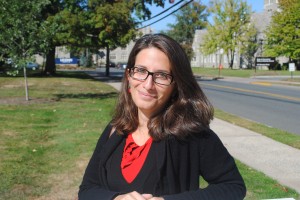 Elena, who graduated in 2014, sent us this update:
Elena, who graduated in 2014, sent us this update:
“This past year I had a scholarship from the Russell Berrie foundation to do a one year certificate in Interreligious Studies at the Pontifical University of Saint Thomas Aquinas in Rome. I just completed the certificate and I am thinking about what to do next.
“I work as a consultant in the communications office of a lay association linked to the Vatican called the Equestrian Order of the Holy Sepulchre which operates in the Holy Land supporting the Christian community at the service of the culture of encounter that Pope Francis often talks about.
“Apart from that I worked to organize a conference with Jewish, Christian and Muslim women leaders and scholars on the theme of family and faith last October. I also taught two classes on interfaith tools and practices in two masters offered by two universities in Rome. That was a wonderful chance for sharing with the students a few things I learned during these past years.
“During this past year I have also been one of the content developers of the project ‘If We Serve’ that you can find online www.ifweserve.org. Together with a team of young Jews, Christians and Muslims, we worked on a textbook for an interfaith retreat on the theme of service that was held in January in the States.
“More recently, I was in the boarding team which organized the Young Leadership Council conference in Rome (the youth branch of the ICCJ which welcomes young Jews, Christians and Muslims).”
Asma Hanif recognized by both Dunkin’ Donuts and the Baltimore Ravens
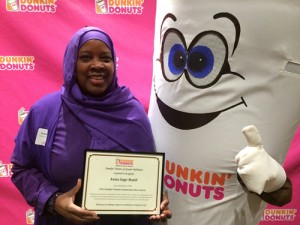 Dunkin’ Donuts recognized chaplaincy graduate Asma Hanif as a 2014 Dunkin’ Donuts Greater Baltimore Region Community Hero for her service to the community as the Founder and Executive Director of Muslimat Al-Nisaa. She was also recognized by the Baltimore Ravens as one of their three outstanding community volunteers and given a 2014 Community Quarterback Award award. Funded by NFL Charities and the Ravens Foundation, Inc., the Community Quarterback Award recognizes individuals who exhibit leadership, dedication and commitment to bettering their local communities.
Dunkin’ Donuts recognized chaplaincy graduate Asma Hanif as a 2014 Dunkin’ Donuts Greater Baltimore Region Community Hero for her service to the community as the Founder and Executive Director of Muslimat Al-Nisaa. She was also recognized by the Baltimore Ravens as one of their three outstanding community volunteers and given a 2014 Community Quarterback Award award. Funded by NFL Charities and the Ravens Foundation, Inc., the Community Quarterback Award recognizes individuals who exhibit leadership, dedication and commitment to bettering their local communities.
The Ravens issues this press release: Since its inception in 1987, Muslimat Al-Nisaa continues to offer a holistic approach to serving marginalized communities of Baltimore. Its mission is to provide health, education, shelter and other social services to the underserved population in general, and to Muslim women and children in particular. The organization is based on the principle that every woman, man and child has a right to receive quality care regardless of race, creed or socio-economic status. As a result of her work as an advanced nurse practitioner, Hanif witnessed religious discrimination while treating sexual assault and domestic violence cases in the female Muslim population of Baltimore. In 2007, she began opening her home to help these women and their children. Her home has been converted into a shelter and has grown over the past seven years to include job training and educational programs for shelter residents, feeding the homeless on the streets through their “Chili Bowl Sunday” program, as well as providing free physicals to those individuals wishing to participate in the Special Olympics. For her continued dedication, Hanif was invited to be a panelist on and is still a current member of the Governor of Maryland’s Domestic Violence Community Initiative. In January, she was invited to speak at the United States Attorney Office’s “Protecting Our Diversity” forum on violence and hate crimes.
New Alum Memoir Recounts Ministries of Social Justice and Service
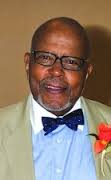 More than a quarter-century ago, the Rev. Dr. Robert L. Polk, ‘55 was honored by his fellow graduates as the Distinguished Alumnus of Hartford Seminary for 1988. Originally from the south side of Chicago, Dr. Polk’s first pastoral call was to be the minister of a rural congregation in North Dakota, an African American leading an all-white congregation. It was the first of many deliberate steps in a ministry committed to civil and human rights. He served as Youth Program Secretary at the YMCA in Minot, North Dakota, Minister to Youth at Riverside Church in New York City, Dean of the Chapel and Acting Dean of Students at Dillard University, and, from 1969-76, Minister of Urban Affairs, again at Riverside Church. Over the years, Dr. Polk continued to be an influential figure in many social justice efforts in the U.S., including early action to combat the HIV-AIDS crisis, meeting heads of state and Pope John Paul II.
More than a quarter-century ago, the Rev. Dr. Robert L. Polk, ‘55 was honored by his fellow graduates as the Distinguished Alumnus of Hartford Seminary for 1988. Originally from the south side of Chicago, Dr. Polk’s first pastoral call was to be the minister of a rural congregation in North Dakota, an African American leading an all-white congregation. It was the first of many deliberate steps in a ministry committed to civil and human rights. He served as Youth Program Secretary at the YMCA in Minot, North Dakota, Minister to Youth at Riverside Church in New York City, Dean of the Chapel and Acting Dean of Students at Dillard University, and, from 1969-76, Minister of Urban Affairs, again at Riverside Church. Over the years, Dr. Polk continued to be an influential figure in many social justice efforts in the U.S., including early action to combat the HIV-AIDS crisis, meeting heads of state and Pope John Paul II.
The story of Dr. Polk’s fascinating and faithful life is now told in his recently published memoir, “Crossing Barriers and Building Bridges,” a copy of which he presented to the Seminary’s Library. Included in the narrative are descriptions of the social and academic life at the Hartford Seminary of the 1950s, when four schools comprised the “Foundation.” While formal dinners in jacket and tie with linen tablecloths and napkins and silver flatware are long gone, the diversity and richness of the students’ faithfulness and backgrounds remain 60 years later.
“Hartford was a very interactive and relational school. The four distinct schools blended readily and provided a great deal of diversity of students in terms of race, color, ecumenical backgrounds and nationality. The school was designed in a way that nearly all of the students, regardless of what school they were in, took classes from other schools and interfaced with each other in and out of the classroom, not only in groups of race, ethnicity and nationality, but places where people with various theological, philosophical and ecclesiastical differences and points of view could rub elbows and learn from each other.”
Do you know of a Hartford Seminary graduate who has a story that should be told? We would love to tell it! Please contact the Rev. Dr. Jonathan Lee, ’10, at jlee@hartsem.edu, and visit the Alumni/ae pages of the Seminary website, oldhartsem.hartfordinternational.edu, for more features on our graduates and their work.
Jay Ebersole’s Gift for the Building Abrahamic Partnerships Program
Hartford Seminary alumnus the Rev. Dr. Jay 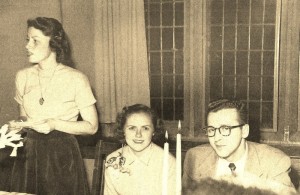 Ebersole ’53, in memory of his wife, the Rev. Dr. Eleanor Ebersole, ’51, ’53, along with their son Mark and Judy Ebersole have made a gift to the Seminary to support participation in the Building Abrahamic Partnerships Program (BAP). He has created an endowed fund, The Rev. Drs. Eleanor and Jay Ebersole and Family BAP Fund, that will provide annual income to underwrite student tuition, travel and accommodation expenses to participate in this program. Dr. Ebersole’s preference is that the scholarship be awarded to current United Church of Christ pastor in the Southern Conference, within which Dr. Ebersole resides in retirement.
Ebersole ’53, in memory of his wife, the Rev. Dr. Eleanor Ebersole, ’51, ’53, along with their son Mark and Judy Ebersole have made a gift to the Seminary to support participation in the Building Abrahamic Partnerships Program (BAP). He has created an endowed fund, The Rev. Drs. Eleanor and Jay Ebersole and Family BAP Fund, that will provide annual income to underwrite student tuition, travel and accommodation expenses to participate in this program. Dr. Ebersole’s preference is that the scholarship be awarded to current United Church of Christ pastor in the Southern Conference, within which Dr. Ebersole resides in retirement.
Building Abrahamic Partnerships is an interfaith community of learning for Jews, Christians and Muslims that provides a solid foundation in interfaith ministry and education. This year, it will be held from June 23 through June 30 on the Hartford Seminary campus.
“I made my gift to Hartford Seminary because of all that Hartford Seminary has meant to me and my wife, Eleanor, over the years,” Dr. Ebersole explained. “I was particularly inspired by the work that has been done to create the Building Abrahamic Partnerships Program, which I read about in a recent edition of Praxis.”
Dr. Ebersole was also inspired to contribute when he learned that a portion of their bequest of his long-time friends and classmates, Bill and Jane Inderstrodt, had helped fund the Abrahamic Partnerships endowed faculty chair, completed this past fall. “We were all very much aware of the growing importance of interfaith dialogue from our studies and from our classmates who came from a wide variety of faith traditions. We were studying in an era when Hartford Seminary professor Dr. Kenneth Cragg, who increased Muslim studies in the 1950’s, created a greater emphasis on the importance of interfaith dialogue, following the lead of Prof. Duncan Black Macdonald,” commented Dr. Ebersole.
Hartford Seminary President Heidi Hadsell commented recently, “It is inspiring to see that our alumni/ae have had such rewarding careers and are now eager to support interfaith dialogue with gifts that will ensure that this training will be available now to leaders of today and tomorrow. I am sincerely grateful for Dr. Ebersole’s thoughtful generosity and his desire to provide interfaith training for pastors from the mid-Atlantic.”
Photo caption: Ebersoles’ Engagement Party with Hartford Seminary Students in Hosmer Hall Dining Room, Feb.21, 1952. Seated: Eleanor Seaton and Jay Ebersole. Standing: Jane (Sattler) Inderstrodt.
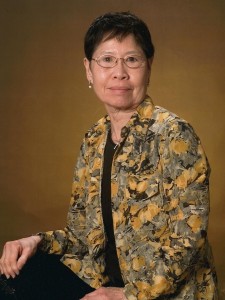 Amy Chan Wolsdorf ’69 Scholarship Fund for Women Established at Hartford Seminary
Amy Chan Wolsdorf ’69 Scholarship Fund for Women Established at Hartford Seminary
Hartford Seminary alumna Amy Chan Wolsdorf, M.A. ‘69 has established an endowed scholarship fund at Hartford Seminary to benefit female students coming to the Seminary to prepare for careers as Christian educators or ministers.
“I had nothing when I came to study in the U.S., but I had help from a Hartford Seminary scholarship and many kind people along the way. Now I feel I must share what I have accumulated with others,” Amy relates. She used these words to explain why she has created an endowed fund at Hartford Seminary. The income from this fund will be used to provide scholarship support for Christian female students at Hartford Seminary.
“We are so grateful that one of our alumna has chosen to make it possible for other women to receive the gift of learning at Hartford Seminary,” said Hartford Seminary President Heidi Hadsell. “Amy benefited from her time at Hartford Seminary which prepared her for a career as a thoughtful Christian educator. We are blessed that she has chosen to provide similar opportunities for women coming to Hartford Seminary in this generation.”
Mrs. Wolsdorf, who was born and educated in Hong Kong, spoke with gratitude about her experience at Hartford Seminary. The memory of that time and being the recipient of financial support has stayed with her over the years. Mrs. Wolsdorf explained that she attended Hong Kong Chinese University after high school, also through scholarships. She attributes her career choice to the profound influence of an English and religion teacher in high school named Lucille Hartman, who was a missionary associated with the United Church of Christ.
Like her mentor, Mrs. Wolsdorf became interested in teaching religion, which she first practiced when hired by her former high school. While there, she continued to work with Ms. Hartman, who suggested that Amy consider continuing her training at Hartford Seminary. Ms. Hartman helped her former student obtain a scholarship to attend the Seminary. Both thought that the multicultural and interfaith aspects of Hartford Seminary would be very beneficial for Mrs. Wolsdorf, who to this day attests to the accuracy of that prediction.
Following her graduation from Hartford Seminary, Mrs. Wolsdorf pursued a career in religious education. She worked as a Christian Education director first for three years in Oregon, then for four years in Ohio before her marriage to Carl Wolsdorf. Following his death, she made her permanent home in Washington State. There she has been involved with a UCC congregation and devotes time to volunteer with an AIDS organization. She also acquired skill with computers and developed a new talent for stock market investment.
Mrs. Wolsdorf believes strongly in sharing her good fortune. “So now I am giving back to Hartford Seminary, which gave me the opportunity for new learning through their scholarship. I hope to make a difference in the lives of other women, who hope to come to Hartford Seminary, by making this scholarship available. I will always remember the Seminary’s compassion and generosity.”
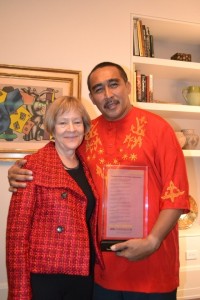 Reverend Jacklevyn “Jacky” Frits Manuputty
Reverend Jacklevyn “Jacky” Frits Manuputty
A recent graduate of Hartford seminary, this fall “Jacky” Manuputty received a Peacemakers in Action award from the Tanenbaum Center for Interreligious Understanding in recognition of his peacemaking efforts, particularly citing his Peace Provacateurs program.
Following his return to Indonesia after completing the International Peacemaking Program and an M.Div degree at Hartford Seminary, Manuputty helped form Peace Provocateurs to use social media to combat religious conflict between Christians and Muslims in Indonesia. After watching local troublemakers use SMS (cell phones) and social media to incite fights or exaggerate events to create discord, Manuputty and a diverse interfaith network of students, lecturers, religious leaders, activist journalists and others decided to retaliate. “If provocateurs could use the new technology to incite violence, we could use it to undermine their incitement,” says Manuputty, a Protestant minister.
To counteract reported conflict, Manuputty and others dispatch volunteers to any location in a matter of minutes to check the credibility of disturbing claims. They then send the facts to the Peace Provacateurs’ leadership to double check the details with other witnesses. In turn, they can craft and send out messages to set the record straight before a crisis arises. SMS text messages spread news most quickly throughout local communities while Facebook and Twitter are also employed (the latter being critical in reaching the local media).
The Peace Provacateurs network has expanded its activities, even posting volunteers in the streets to address flare-ups directly. To reinforce normalcy, they now send texts, tweets and photos to demonstrate and reinforce the fact that the vast majority of people in Indonesia coexist peacefully and have no interest in supporting violent reactions.
Such campaigns have been widely recognized for their success in limiting the scope of the conflicts and preventing them from spreading. Many of these models have been adapted for use in other parts of Indonesia.
Haidar Reda Working on Center for Interfaith Dialogue in Iraq
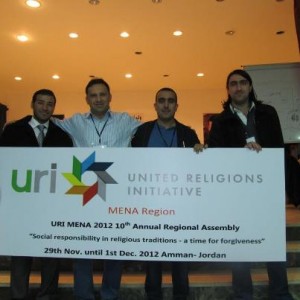
A graduate of the International Peacemaking Program in 2012, Haidar Reda came to study at Hartford Seminary “to gain knowledge, skills and practices to incorporate into my research and dialogue.” Interfaith dialogue is important to Haidar, because “as an Iraqi citizen, the conflicts in Iraq and in the Middle East affect my daily life on a very personal level. Misunderstanding of other faiths causes the conflicts. When there is interfaith dialogue, we can find the common ground among faiths,” he said.
Haidar has returned to Iraq with the goal of establishing a center for interfaith dialogue. Already he has established a non-profit organization called Ur for Interfaith Dialogue and Peacemaking, which is dedicated to interfaith dialogue and peacemaking. Its mission is to build respectful relationships among diverse individuals and communities and to forge common ground that promotes social justice, peace and freedom among the people.
For his initial steps, Haidar has built a Facebook page for this organization that provides interfaith research, images and short descriptions of various centers in Iraq that are part of a mosaic of different faith traditions. To promote interfaith dialogue, he has also begun introducing individuals to these religions by offering guided visits to these sites, such as the Sabean Mandaean Mandi, a site of the oldest monotheistic religion in Mesopotamia—modern Iraq. Visit Ur for Interfaith Dialogue and Peacemaking on Facebook to see these images.
In addition, Haidar has also been participating in interfaith conferences. He notes that a wonderful and interesting URI MENA (United Religions Initiative—Middle East & North Africa Region) conference was held on November 29-December 1, 2012 in Amman, Jordan. Entitled “Social Responsibility in Religious Traditions – A Time for Forgiveness,” the conference included a variety of discussion topics and provided an opportunity for building peace in the region through dialogue and cooperation. Haidar delivered a presentation, “Mercy and forgiveness in the Bible & Qur’an.”
 Sign-up now ›
Sign-up now ›